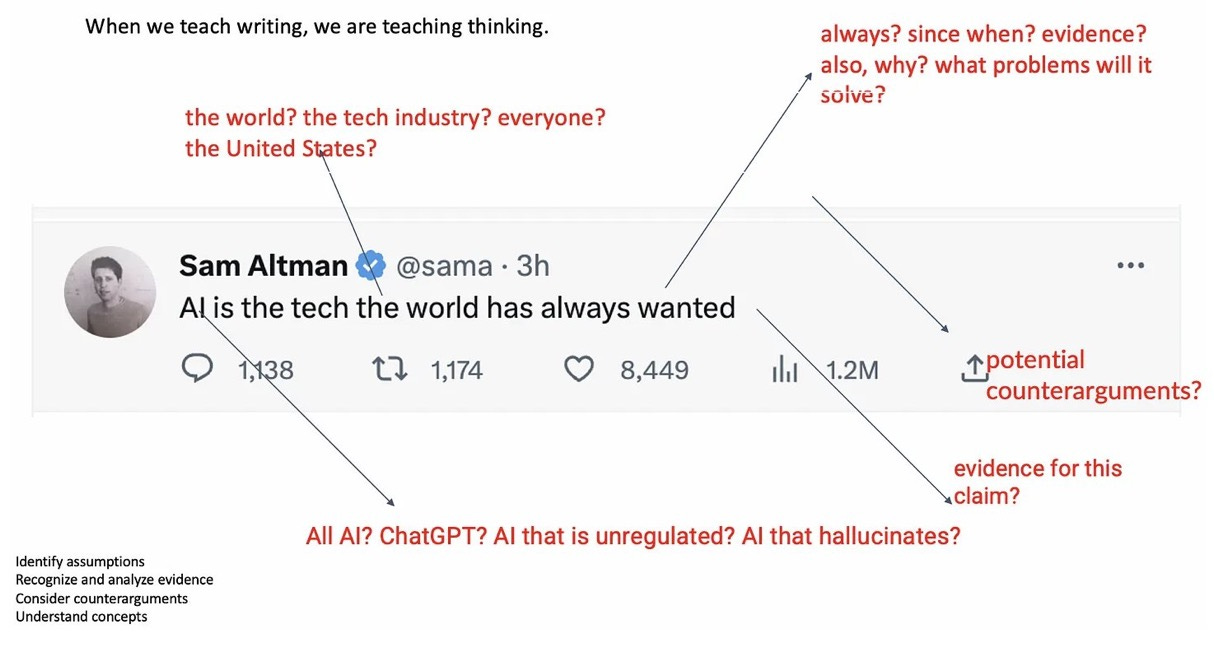I’ve been thinking about satire this week.
One reason is because I went to my local college (College of Charleston) to see a terrifically interesting lecture by Dr. Brittney Edmonds of the University of Wisconsin titled: “Satirizing Satire: Representing Blackness and the Social Protest Mountain.”
It would be hard to find a subject more in the wheelhouse of my interests given that I have been known to write satire, once edited a cultishly popular website that traffics in satire, and the central text in Dr. Edmonds’s lecture was Percival Everett’s masterpiece Erasure. (Everett has published a number of masterpieces, and next year’s James will be joining them, but Erasure is right up there.)
Dr. Edmonds argued that a reductive, and frankly bad kind of reading happens when contemporary Black writers work in satirical modes as the reviewers and scholars come from a default position that the text must primarily (or maybe even exclusively) be a commentary on being Black in the world. This framing causes us to miss many potentially more interesting and productive ways to talk about a text, essentially ignoring the forest to focus on the most convenient tree.
I know it was a good lecture because as Dr. Edmonds was speaking, a dozen different trains of thought moved through my own brain. Here was a highly knowledgeable scholar shining a light across territory I’m familiar with, but also managing to illuminate areas I’d never looked at carefully before.
Fantastic stuff, the kind of thing that makes me miss my association with higher education institutions and grateful that I live in close proximity to a college that provides this kind of programming and supports the work of people like Dr. Edmonds by bringing them in to give a public lecture.1
The other reason I’ve been thinking about satire is because Elon Musk went to do something or other at the Mexico/U.S. border and walked around in a backwards cowboy hat.2
At this point, Elon Musk is self-satirizing. It would be difficult to imagine a more absurd, exaggerated figure than the one Musk cuts in real life. One of the reasons so many people are looking at Walter Isaacson’s biography of Musk (Elon Musk) and saying, “Dude, WTF?” is because Isaacson’s attempt to craft a complicated and troubled, but also “great man” story out of the actions of an erratic (possibly ketamine addicted) manchild requires a purposeful ignoring of what is happening in plain view.
I highly recommend
’s deconstruction of Isaacson’s method in his review of Elon Musk to better understand the result of this mismatch between authorial intention and observable reality.IMO, the great satire of Silicon Valley has already been produced. I’m talking about Mike Judge’s HBO series, Silicon Valley. First broadcast in 2014, the show elegantly and seemingly effortlessly punctures the pretensions of tech moguls who insist that they are making the world a better place, even as those efforts primarily serve to enrich themselves. The core ethos of these madmen was perhaps best characterized in the words of Gavin Belson, (a kind of Zuckerberg/Musk amalgam, and head of the Google-like Hooli), who said, “I don’t want to live in a world where someone else makes the world a better place better than we do.”
The early seasons of Silicon Valley are mostly absurdist, LOL comedy achieved through a satiric lens. They operate in the tradition of Horatian satire, an approach that mostly pokes gentle fun at the objects of ridicule, making the objects absurd in a way that allows the object to deny the satire’s connection to reality. Reportedly, lots of Silicon Valley CEOs professed to enjoy Silicon Valley the show, perhaps because the Horatian approach allowed them to view the mocking and think: Well, that’s not me.
Perhaps it’s interesting and telling that Elon Musk does not seem to understand the satire of one of his “favorite” books, The Hitchhiker’s Guide to the Galaxy.
Over time, Silicon Valley slipped more toward the Juvenalian mode of satire, a biting and ironic approach designed to more directly critique the object of the satire. The final season of Silicon Valley is a much darker affair, which nonetheless wraps up in a happy ending for the long suffering protagonist and ultimately eternal idealist, Richard Hendricks, founder of one-time scrappy start-up Pied Piper. To me, the conclusion was simultaneously satisfying because I wanted a win for Richard and the crew, and a bit of a cop-out because the world Judge had shown us would never allow for such an ending.
Mike Judge is an interesting satirist. Upon creation, his works are very much Horatian, absurdist exercises played primarily for laughs. His cult-classic film, Idiocracy posits a world where only the least intelligent people breed, and over time, the operations of the entire country are given over to corporations that sponsor everything, including government. Luke Wilson’s character, a low-level soldier in the U.S. Army, is chosen for an experiment in cryogenics because he is deemed to be the most average male in every way. He’s supposed to be frozen for a year, but due to an accident, is suspended for 500 years, finally waking up in this new dystopia, suddenly the smartest man in the world.
The nation is suffering. The president is a former professional wrestler (played by Terry Crews), who fires an automatic weapon into the ceiling of the Congress to quiet debate. The number one show on television is “Ow My Balls” in which a character is shown suffering a series of increasingly harsh blows to his junk, a very slight exaggeration of America’s Funniest Home Videos, and maybe even an inspiration for later show, Tosh.0.
Full disclosure, I have laughed unironically at the “Ow My Balls” footage.
Agriculture is failing because it’s been decided that all crops should be irrigated with a Gatorade-like substance called Brawndo, that everyone drinks because “It’s got electrolytes!” (The sodium in the drink is killing everything.)
Ultimately, it falls on Luke Wilson through a series of misadventures to save the world by applying his perfectly average intelligence, including suggesting they use water on crops, rather than Brawndo. Others are skeptical, though. Why? “It’s got electrolytes.”
Idiocracy was made in 2006, and while not every last joke works, the ones that do work are hilarious.
Or maybe were hilarious? Over time, Judge’s Horatian creation has come to seem much more Juvenalian. It has become more difficult to LOL at the poking fun at societal foibles when those foibles seem to be not as funny or harmless anymore. In the film, the actor and now podcaster Dax Shepard plays Luke Wilson’s “lawyer,” an overconfident dum-dum convinced everyone else is wrong about everything. Just this week, real-life Dax Shepard, co-host of the only semi-ironically named “Armchair Expert” podcast earned
Lenz’s “Dingus of the Week” award for his gallumphing opinionating about trans rights rooted in received ignorance and blithe overconfidence.There was a time where writing (and editing) satire was my main avocation. My (failed/out of print) novel was a satire. My collection of short stories is filled with satires. I creatively oversaw an entire publishing imprint focused on satire. My goal with all of those projects was to make people laugh. Sure, there was some serious stuff underneath, but it was underneath. It was all very Horatian of me.
Over time, though, I’ve lost a lot of faith in that project. I can still get a good sardonic laugh at a McSweeney’s piece, no doubt, but I find that especially sharp pieces of satire, like this Musk-themed effort by Mike Langley “I Will Defend Free Speech to the Death. Or Until an Autocrat Makes Me Stop” makes me sad and angry because of its success as a work of satire.
I have a novel manuscript with my agent (currently titled Good White People) that is almost purely Juvenalian. I wrote it as an indictment of my own characters and perhaps even myself. Is it funny? Sort of, in the it delivers short barks of “hah!”, as the ironies are detonated, but ultimately, it’s hard to feel hilarity about the issues it takes on. Despite feeling increasingly positive about its literary potency, (a rarity when it comes to my own writing) I have very low expectations for its potential to find a publisher, because how many people want to experience a novel that is an indictment of the world, and perhaps even the reader themselves?
Good times! Amirite?3
Percival Everett is a great example of a writer who mixes and moves between the Horatian and Juvenalian satirical modes (when he’s writing satire, which is often, but not always).
His recent novel, Dr. No, a riff on James Bond, is downright silly, filled with puns and wordplay and parody of the Bond universe that will make you giggle. The Trees is primarily Juvenalian, a quasi-noir, but there’s some moments where the juxtaposition of the noir mode and what’s happening on the page are humorous enough to trigger full laughter, even as this is a novel about lynching.
James, a kind of sequel to The Adventures of Huckleberry Finn told from the point of view from the character Jim, is similar to The Trees, though I would argue some of the juxtapositions Everett conjures straddle the line in a way where you are undoubtedly laughing, but wondering if you should be.
To me, that’s a kind of genius.
I’ve produced some decent satire in my day, but I don’t possess that kind of genius, so I tend to shy away from taking fresh swings at the form, even when tempted because the world seems too precarious for the Horatian mode, and working in the Juvenalian mode makes me feel the precarity of the world too acutely.
I was recently tempted to jump back into the satire fray by a bit of nonsense shared in the Substack notes feature, by Substack co-founder
in which he declared, “The right machines make us more human.” It’s not quite Gavin Belson level stuff, but as an aphorism, its combination of empty sentiment, ignorance of history, and general cluelessness sounded ripe for satirizing.Perhaps I could’ve done something similar to
’s writing teacher deconstruction of a Sam Altman tweet.Or maybe I could do short vignettes about machines making us more human over time, perhaps including one about the first person to get run over by a wheel, introducing humanity to the reality of being bipedal in a world of rolling objects.
But pretty quickly I ran out of steam, either because it’s not that great a target for satire, or because my satire chops are too out of practice, or because the thought of mocking something that so many people seem to believe without irony or care for the consequences of that belief made me feel very weary.
The best I can do for the moment is point out that Best’s faux profundity is thoughtless and absurd, as thoughtless and absurd as Elon Musk walking around in a backwards cowboy hat.
Links
At the Chicago Tribune this week, I explain why I’m glad some big name writers have sued tech companies over the authorized use of their books as part of the generative AI training data. You should also check out
’s thoughts at her newsletter. We really are moving into the unknown.Over at his newsletter
has a list of some fantastic “surreal” reads.Electric Literature has a list of 15 books from small presses you should be reading this fall.
The odds for the winner of the next Nobel Prize in Literature have been posted.
As if the books of September weren’t enough, we now have the Times’ list of the 18 books we’re supposed to read in October.
My old friends at McSweeney’s have a new one from the inimitable Wendy Aarons, “Seeking Representation for My Unbanable Book.”
ICYMI it from Wednesday, we have another book that more people should know about.
Recommendations
1. The Phantom Tollbooth by Norton Juster
2. Frankenstein by Mary Shelley
3. 84 Charring Cross Road by Helene Hanff
4. Mercury Pictures Presents by Anthony Marra
5. The Parrot and The Igloo by David Lipsky
Sylvia W. - Scottsdale, AZ
Just seeing the title The Phantom Tollbooth makes me want to read it again. How long has it been, 40 years? Anyway, I think for Sylvia, the right call is Ya Gyasi’s tapestry of stories, Homegoing.4
And that’s a wrap on another week. According to the Substack backend interface this will be the 169th post at The Biblioracle Recommends. This publication runs on a patronage model in order to keep the content freely available for all, so if you do enjoy the newsletter and you have the resources, please consider a paid subscription.
Until next time…
JW
The Biblioracle
The lecture was part of the Dr. Conseula Francis lecture series, named after a former colleague who passed away suddenly in 2016, and it was both great and awful to be reminded of Conseula’s presence/absence on campus. I wrote a short tribute upon her passing that may be of interest to some.
Just as a bit of disclaimer, because of the need to focus a majority of my energies on writing a book (see last week’s newsletter), rather than doing the kind of research that I usually try to bring to topics here, I’m going to be writing from stuff I know, or think I know, but I might get some things wrong. But that’s okay. Consider this just one guy’s thoughts about how satire works (or doesn’t) in the world. Disagreement is most welcome.
Even if it’s never published, writing the book worked as a kind of therapy for me in the early Trump years, so I’ll always be grateful for its existence.
All books linked throughout the newsletter go to The Biblioracle Recommends bookstore at Bookshop.org. Affiliate proceeds, plus a personal matching donation of my own, go to Chicago’s Open Books and the Teacher Salary Project, which is advocating to establish a federal minimum salary for teachers of $60,000 per year. Affiliate income is $239.70 for the year.








Idiocracy was so good, it has become scary.
I began to seriously worry that my satire was being taken seriously about 10 years ago, and I began gradually moving away from it. It was devastating to realize that I needed to be mindful of people with no refined sense of irony when writing.
Your ridicule of these tech bros is well placed. My recent post questioning if Substack cares if the AI bots are crawling through our Substack posts has so far received zero response from the Substack team. This is despite a few high profile readers nudging them. Read the post here if you are interested:
https://boodsy.substack.com/p/the-ai-bots-are-coming-for-your-substack
I would be interested to know how you perceive bias when they promote writers.